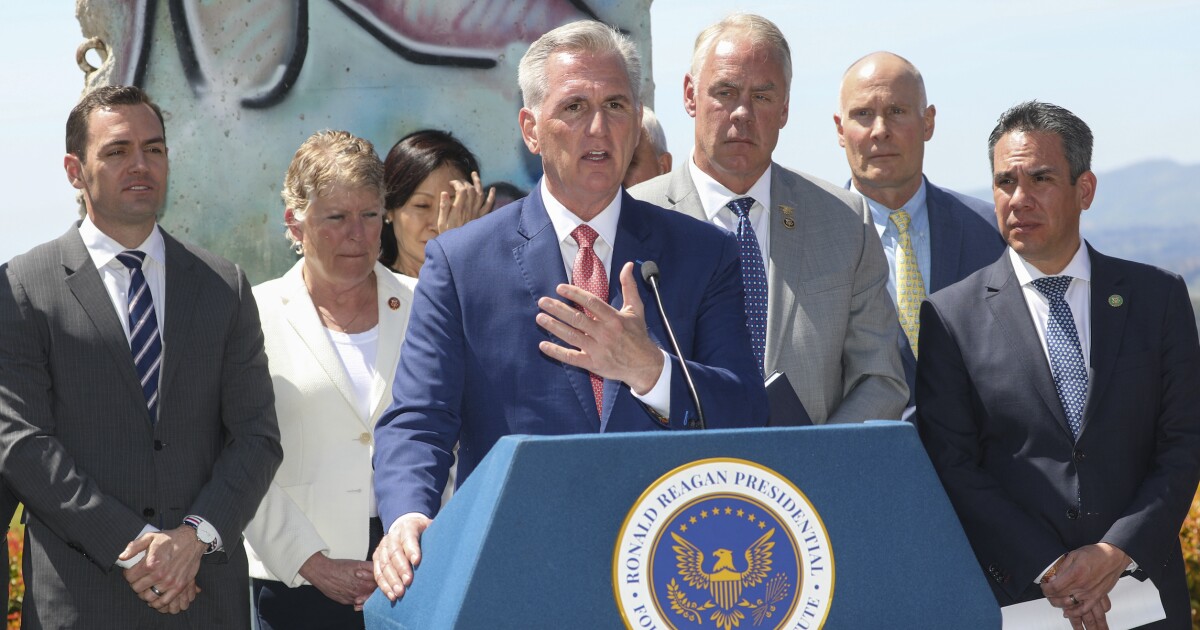

House Speaker Kevin McCarthy‘s (R-CA) 15 ballots to secure his job seem like a distant memory 100 days into the Republican majority, but his biggest challenges lie ahead.
Republicans have managed to pass a few bills that divide Democrats. Some of these measures have made it through the Senate, where Republicans not only lack a majority but actually lost a seat last year. President Joe Biden has even felt the need to sign some of them into law, though he has also issued the first two vetoes of his presidency during this time period.
But so much is still riding on whether McCarthy can make it through a debt ceiling showdown with Biden while neither capitulating on spending nor sending the country into default. His speakership may depend on his success.
One thing McCarthy has succeeded in doing in helping his party overcome long odds — Republicans do not control the White House or the Senate — is identifying legislation that cannot be filibustered or kept off the legislative calendar by Majority Leader Chuck Schumer (D-NY). The Congressional Review Act, which allows Congress to repeal regulations published in the last 60 days, is one way to do that. Resolutions of disapproval of Washington, D.C., laws are another.
The other was finding issues that divide Democrats. There is a generational and ideological split within the Democratic Party over crime. Biden is trying to push Democrats away from defunding the police while big-city mayors and councilors, such as those found in 2024 DNC convention host city Chicago, position themselves well to the president’s left.
The vote on overturning a crime bill passed by the liberal council of the District of Columbia was instructive. Washington, D.C., is suffering a crime wave, like many large, Democratic-governed urban areas. The issue limited Democratic gains in the 2020 elections and remained a liability in the midterm elections. Democrats on the D.C. Council responded by relaxing penalties for serious crimes ranging from carjackings to homicides over the mayor’s objections.
Biden and the Democrats support D.C. statehood. Short of being able to deliver that, they would like to be seen as strongly supportive of home rule. But D.C.’s three electoral votes are assured next year. The votes of suburbanites worried about urban lawlessness intruding into their neighborhoods remain vigorously contested and may prove unavailable to Democrats seen as soft on crime.
The White House issued a statement of policy saying that it opposed a Republican attempt to overturn this law, as Congress has the constitutional authority to do in the federal district. But more sober minds in the West Wing eventually won out, considering the pitfalls of defending this crime policy. Biden relented.
“I support D.C. Statehood and home-rule — but I don’t support some of the changes D.C. Council put forward over the Mayor’s objections — such as lowering penalties for carjackings,” Biden said in a Twitter statement shortly after informing Senate Democrats in a closed-door meeting of his new position. “If the Senate votes to overturn what D.C. Council did — I’ll sign it.” House Democrats weren’t tipped off accordingly.
Democrats were taken aback by Biden’s shift. Liberal activists and commentators condemned it as a sellout designed to win swing voters in 2024.
On declassifying intelligence on COVID-19 origins, Democrats did not mount even token opposition to legislation McCarthy moved to force Biden’s hand. The House passed it 419-0. It then cleared the Senate by unanimous consent.
McCarthy’s other COVID-19 victory came on lifting the national emergency. As was the case with crime in D.C., most House Democrats tried to hold the liberal line, assuming Biden was with them. Instead, the White House abandoned them.
CLICK HERE TO READ MORE IN THE WASHINGTON EXAMINER
A loss in the debt ceiling fight, either through the failure to extend before the bills come due or the inability to deliver on any spending cuts, will obviate most of these successes. Democrats are hopeful recent history means they can prevail in this conflict.
McCarthy and his young House Republican majority are still entering in a better position than seemed likely after November’s results or January’s infighting.





